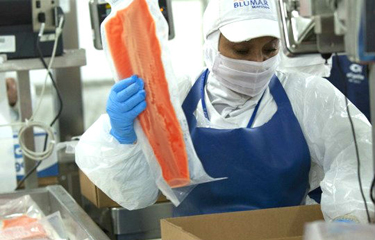On the heels of announcing having agreed on a USD 300 million (EUR 254 million) loan to refinance existing debt and bolster financing for exports, Santiago, Chile-based fisher and salmon farmer Blumar posted a USD 44.2 million (EUR 37.4 million) net loss for the third quarter of the year.
Consolidated revenues reached USD 358.9 million (EUR 303.8 million) for the quarter, which Blumar broke down by category: Atlantic salmon 51 percent; fishmeal and fish oil 23 percent, frozen horse mackerel 14 percent; other fish 9 percent; and coho salmon 2 percent. Earnings before interest, taxes, depreciation, and amortization (EBITDA) dropped 57.1 percent to USD 22.5 million (EUR 19.0 million) from USD 52.5 million (EUR 44.4 million) in the third quarter of 2020, which the company attributed to poor results in its salmon business. EBITDA for its fishing segment – fishmeal and oil, horse mackerel, and whitefish – reached the highest EBITDA in the last five years, closing September at USD 47.2 million (EUR 39.9 million) versus USD 32.2 million (EUR 27.2 million) in Q3 of 2019, while EBITDA for its salmon business came in at a loss of USD 24.7 million (EUR 20.9 million) for the third quarter of this year, compared to a gain of USD 20.2 million (EUR 17.1 million) in the same period one year previous.
Production of Atlantic salmon jumped 142 percent year-over-year to 49,095 metric tons (MT) at the close of September, with sales increasing 88 percent to 43,270 MT. However, the average sales price per kilogram of the salmon (whole fish equivalent) dropped 28 percent to USD 4.28 (EUR 3.62) during the quarter, from USD 5.96 (EUR 5.04) one year before.
In comparison, Blumar’s fishing activity was more stable. Fishmeal production increased 5 percent year-over-year to 33,200 MT, with prices up 2 percent; the production of frozen horse mackerel was up 8 percent to 61,405 MT but prices fell 9 percent; and fish oil production was down 8 percent to 9,844 MT, with prices up 24 percent.
Regarding the USD 300 million loan, Blumar said in a release signed by general manager Gerardo Balbontin and sent to the financial markets commissioner CMF that the company had signed commitments with creditors Coöperatieve Rabobank UA, Banco de Crédito e Inversiones, Banco Santander-Chile, Banco Security and DNB Bank ASA. The loan is divided into two tranches: the first is for USD 200 million (EUR 169 million), is extendable up to a maximum term of seven years, subject to the fulfillment of conditions including semiannual capital repayments, with an initial grace period of two years. The second tranche for USD 100 million (EUR 84.3 million) is in the form of a committed line of credit, for a term of three years.
“The conditions agreed for the aforementioned rescheduling and financing provide more flexibility to the debtors than the conditions of their current bank liabilities,” the company noted, adding that the move forms part of the restructuring and financial strengthening in the capital increase agreed upon during a shareholders extraordinary general meeting held on 20 August.
Blumar expects to conclude the restructuring and financial strengthening process by 30 December.
The company is still dealing with the after-effects of mass mortality at its Caicura grow-out center, located in the Los Lagos region, resulting from cages sunk in heavy storms, reported on 27 June. A total 875,125 salmonids in the fattening stage – at an average weight of 3.8 kilos – were registered in 18 cages at the center, two of which saw escapes and the other 16 sinking to the seabed. Blumar performed prospecting studies and analysis of images taken with two underwater robots (ROVs), and with high-tech Hammerhead sonars, and found that 88 percent of the fish in the center, equivalent to 2,900 MT, perished with the cages sunken at a depth of 295 meters. According to recent local press reports that quoted Felipe Gonzalez, captain of the port of Puerto Montt, the company will not be able to refloat the sunken cages and perform the necessary recovery works until 2021.
Following its own investigation, Chile’s National Fisheries and Aquaculture Service (Sernapesca) announced late October that it would file a complaint against Blumar with the national environmental watchdog, SMA, over the Caicura incident.
In late October, the company submitted a proposed project to the national environmental impact evaluation service (SEIA) for a USD 4 million (EUR 3.4 million) expansion of its frozen products plant, located in the Isla Rocuant sector in the municipality of Talcahuano. The project would expand raw material processing capacity for frozen fish production of Blumar’s Pesquera el Golfo brand, from 200 tons per day to 600 tons per day.
Blumar Seafoods has more than 60 years of experience in the industry. Its main destination market for fresh and frozen salmon is the United States where it has a commercial office that distributes throughout the country, and it also forms part of a venture in China for the sale of salmon. It has commercial offices in Spain for the sale of horse mackerel, and in its local market of Chile it retails with the El Golfo Comercial brand.
Photo courtesy of Blumar







